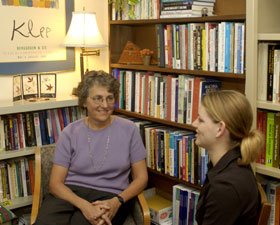|
This is an archived article.
For the latest news, go to the Advance Homepage
For more archives, go to the Advance Archive/Search Page. |
||
|
Dedicated Advisor Opens Students'
Ratcliff, an assistant professor of sociology, has been advising students about their plans of study for some 20 years. Earlier this year she was named recipient of the 2002 Outstanding Faculty Advisor Award.
"What is important and engaging for me in advising students," Ratcliff says, "is to take the time with a student and make the exchange a true 'advisable moment': to help students discover more about the University and about themselves, to encourage them to think more proactively about their education, and to provide an opportunity to reach students in ways very different from what happens in regular classroom teaching." Sometimes students will e-mail her to ask if they can stop by. Many times they'll just pop in to chat, whether she has office hours or not. "I'm always happy to listen," Ratcliff says. Her advisees include sociology majors, sociology honors students, and individualized majors. "I care about students and their lives," she says. For Ratcliff, advising is much more than helping students figure out their schedules and what courses are required. "My advisees and I need to look at those things, but if that's all we talk about, I don't really learn anything about them," Ratcliff says. "But if I start asking questions about what they think their strengths are, what they think they want to do in the future, how they think they classes are helping them learn about that, and are they involved in extracurricular activities, then I can be more helpful." For instance, "if a student loves his or her Spanish class," she says, "I ask if they are involved in the Spanish community. I ask if they've considered an internship or study abroad in Spain. It amazes me how few students have looked very broadly at the possibilities." Ratcliff says it's important to convey to students that while academics are important, college shouldn't be "just a series of courses and a degree. "I tell students to take charge of their education," Ratcliff says. "Take courses that you really care about. Do things that you really care about. Leave here with something to be excited about, perhaps to pursue intellectually. Hopefully, a liberal arts education gets you interested in many things that will serve you for a lifetime." Sometimes students have a "life goal that doesn't involve any of the things they like to do," Ratcliff says, noting that such a goal is often what a parent wants the student to do. Students whom Ratcliff currently advises and has advised in the past say she has made important contributions to their lives. "She has been a major part of my college career," says Kaylin Emanuel, a senior, who met Ratcliff in the middle of her junior year. "I was in the midst of changing my major, was interested in health education, and thought talking to someone in sociology would be my best bet." Ratcliff "happened to be standing outside the main office and, out of the goodness of her heart, she noticed I looked out of place and asked if she could help," Emanuel says. "I explained my reason for being there and instead of directing me to the secretary, she took the time to talk to me about the individualized major program." Today, Ratcliff is her main advisor and Emanuel has taken several courses, including independent studies, with her. Emanuel says Ratcliff "combines an incredible amount of intelligence and experience with the most sincere compassion for her students." Paul Needham, a sixth semester sociology major, says, "Professor Ratcliff has always been incredibly helpful to me. The last time I met with her, I told her that I might want to study abroad for my master's degree and that my concentration would most likely be in organizational sociology. Before I had finished my sentence, I had the name of a sociology professor who had taught in Australia - my top choice for country abroad - and the names of two professors here as well." Needham says Ratcliff is "incredibly approachable. "I've never had any trouble scheduling an appointment with her, dropping by her office, or staying late after class to have her answer questions. I always leave her office feeling like I'm better off than when I went in." Mary Etienne met Ratcliff when she invited her to join the honors program for sociology. "I'm currently doing an honors semester in New York City and I have her to thank for this exciting and wonderful opportunity," Etienne says. One piece of advice Ratcliff regularly gives to students: take a year off before going to graduate school. "Many students say they want to go to graduate school, but they don't know what field they want to go into," Ratcliff says. "I say, if you don't know what area to study, don't go. Wait. Get some real-world experience before making this huge commitment." Ratcliff says what is most gratifying is "having an effect on students' lives. I present options that they haven't considered, which opens their minds to new possibilities." |
 he calls them
'advisable moments', but for the students who have
Kathryn Strother Ratcliff as an advisor, they're
much more than that.
he calls them
'advisable moments', but for the students who have
Kathryn Strother Ratcliff as an advisor, they're
much more than that.

